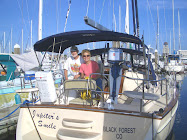I shall relate a story that illustrates how healthcare concerns may be handled outside of the United States. We have become friends with a 75 year old gentleman from the UK. He sailed a Contessa 32 around the world with his wife in the 1970s and on his present vessel, a 36 foot sloop he has circumnavigated again, single handed. He keeps a fine racing bicycle on his boat. In his youth, he was a bicycle racer and he still dresses for racing and rides his bike whenever he gets the chance. Last year, he took time to tour the US Rocky Mountains by rental car and had his bicycle with him. He bicycled many of the mountain passes reaching a elevation of over 12,000 feet several times. He seems fit and full of life.
A short while ago, soon after we arrived in Marina Vallarta, he asked me if I had a recommendation for a doctor with whom he could schedule a physical. I didn’t, but I made a query on the cruiser’s net on the radio the next morning. I got a name and number and gave the information to him. He eventually called and went for his physical exam. A complete exam was priced at 6000 pesos, but he didn’t want to pay that much (a little more than $400 USD.) He settled for a 2000 peso exam. During the EKG and stress test he got to just 2.5 mph and hardly an elevated pulse rate when the doctor stopped the test and said that our friend needed to go to the hospital and have an angiogram immediately. The doctor said that this would cost about $17,000 USD. Our friend was startled to say the least. He told me afterwards that the idea for the physical arose because of some mild indigestion he had been experiencing over the past month.
At the end of our dock is a mega yacht, Invader (164’). The captain and crew are nice people, friendly with us all. Our friend related his situation to the captain. The captain offered the use of his telecommunication system so that information could be relayed back and forth between Mexico and the UK. Our friend called his insurance provider in the UK, but after that, e-mail and fax served to facilitate communications. The doctor sent the EKG and his report to our friend’s doctor in the UK and the doctor replied by email that our friend should go to the hospital immediately. When the hospital replied, the cost of helping him was now $75,000 USD.
“Immediately”, became relative as the UK insurance carrier and the hospital haggled over the price (add the six hour time time zone difference to this mix). I do not know the final details, but the UK insurance agreed to cover the bill and our friend walked to the hospital at 6 pm immediately, the next day. The hospital admitted him and started an IV, but they would not perform the procedure until the following day, immediately. 6 pm is not the ideal time to try to gather a surgical team together on a Friday night during a three day weekend (Constituçion Day on Monday).
At 6 pm, the next day, Barb and I went to visit our friend. He was in the ICU with the doctor checking on him after having discovered three coronary arteries 95% blocked. He had repaired those with four stents. A fourth artery was 65% blocked and that artery was repaired without stents. The doctor said that our friend had been very lucky to have avoided a massive heart attack. The hospital staff asked him if we could gather his belongings out of his regular hospital room and take them home because personal items are not allowed in the ICU where he would be overnight. After a chat with our friend, we did that. So, I saw the ICU, walked past the nursery (no occupants) and explored his regular hospital room.
This hospital was as up to date as any hospital in the United States with state of the art monitoring in the ICU. The private room in which our friend spent the first night was nicer than any hospital I had seen in the US. All was as spotlessly clean as the ICU for which I, as the Senior Corpsman, had responsibility as we received frequent awards from the Commander of the USNH Philidelphia. I notice these things with a trained, critical eye.
The next morning, I called the hospital to learn that our friend was still in the ICU waiting for the doctor’s orders. The ICU has visiting hours from 12 to 12:30 and 6 to 6:30 only (we had lucked into 6:25 the day before and the staff were relaxed about us staying past that time) so unless we heard that our friend was released from the ICU, we knew we could not see him until noon. At noon, I walked over with his belongings so that, if he was being released, he would have them. The doctor was there as I came in and said that our friend was being released to home (his boat) so after another chat, I left his belongings with him and left saying that I could accompany him back to his boat if he would call me. He said he didn’t need me to do that. He would call a cab. I knew he wouldn’t and he didn’t. I learned that he had walked most of the way back to the boat before stopping at Starbuck’s on the way. Later, I checked at his boat and saw that it was occupied, but decided that I would not disturb him. Later, I got a text message stating that he was aboard, okay and glad to be back.
Does this story sound much different from healthcare in the USA. I don’t think so. I have every confidence that should Barb or I need attention that we could rush back to the US, but probably wouldn’t. Of course, that would depend on our insurance coverage ... immediately!



